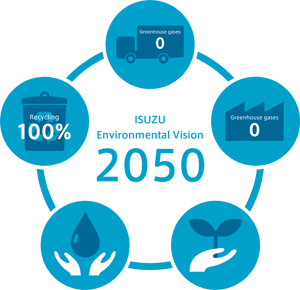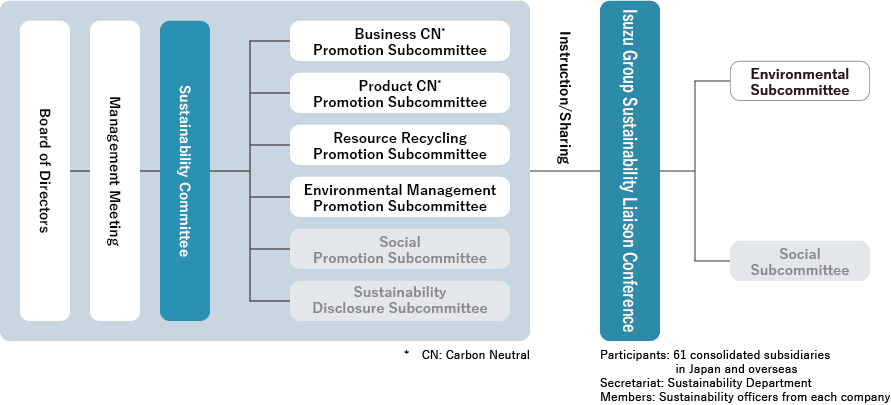- Sustainability TOP
- Environment
- Environmental Management
Environmental Management
Basic Approach
The Isuzu Group actively strives to consider environmental conservation in all business segments, aiming to achieve Sustainability No.1, one of the MISSION outlined in ISUZU ID.
Additionally, through the development and operation of an environmental management structure, we work to reduce environmental impact in all aspects and are committed to achieving Isuzu Environmental Vision 2050 and contributing to the realization of a sustainable society.
Isuzu Group's Charter on the Global Environment
All Isuzu Group members use the Charter as a guideline when pursuing environmental activities.
Basic Policy
Realization of a prosperous and sustainable society
We, the members of the Isuzu Group, regard it as an important business challenge to preserve the global environment so that our planet remains prosperous and sustainable and can be passed on to future generations. In this regard, we pursue our business activities in all areas with an awareness of environmental conservation.
Reduced environmental burden for all business operations
The Isuzu Group recognizes our responsibility in supporting transportation, offers enhanced products and services to our global customers through close cooperation with all Group companies, and develops and operates our environmental management system to reduce the environmental burden of all of our business areas.
Action Guidelines
1 Create a sustainable society
We coordinate our business operations and environmental initiatives, thereby offering environmentally-aware, high-value-added products and services to society.
2 Comply with environmental laws and minimize the environmental load
In an effort to minimize the impact on the environment from our business operations, we ensure that we comply with environmental laws and engage in key environmental issues in all of our business areas from development to production, distribution, sales and servicing, addressing climate change, resource recycling, prevention of environmental risks from hazardous substances, environmental measures and conservation of biodiversity.
3 Promote environmental technology
We promote the development of technology to reduce the environmental load applied throughout the product lifecycle.
4 Maintain proactive social communication
We maintain a positive attitude toward the disclosure of product, service, and business activity information on the environment, promoting good communication with members of society and communities, and work toward realizing a prosperous society.
5 Foster environmental awareness as corporate citizen
We engage in perpetual efforts to foster environmental awareness in each Group member as a corporate citizen operating in a local community, encouraging them to learn about and act toward environmental conservation.
Isuzu Environmental Vision 2050
In order for society to be prosperous and sustainable in 2050, and for Isuzu to continue to support transportation, in March 2020 the Isuzu Group formulated our Isuzu Environmental Vision 2050.
The Environmental Vision represents the Isuzu Group's desired future state, established through a scenario analysis of 2050 based on climate-related and socio-economic scenarios.
The Environmental Vision identifies four key environmental challenges (Climate Change Measures, Resource Recycling Promotion, Environmental Risk Prevention Measures, Biodiversity Conservation), and by collaborating with stakeholders to advance these initiatives, we aim to achieve five Aspirations.

2030 Environmental Roadmap
To achieve the Environmental Vision, we established the 2030 Environmental Roadmap (hereinafter referred to as the roadmap) in 2022. This roadmap outlines the goals (2030 Challenge) and specific action plans (Global Action) to be pursued by 2030 as intermediate stepping stones.
This roadmap represents Isuzu's collective commitment to realizing the Environmental Vision, formulated through discussions with our stakeholders, as of 2022. Technological advancements and societal changes may significantly alter the situation in the future. While flexibly adapting to various changes, Isuzu will promote Green Transformation (GX) across all of its business activities to achieve the Aspirations in the Isuzu Environmental Vision.
Isuzu Environmental Vision 2050 and 2030 Environmental Roadmap
| Isuzu Environmental Vision 2050 | 2030 Environmental Roadmap | |
|---|---|---|
| Aspiration | Goals | Global Action |
Zero GHG emissions from operations |
|
|
Zero GHG emissions across product |
|
|
100% recycling of waste and end-of-use vehicles |
|
|
Safe, reliable operations and products |
|
|
Conserve native biodiversity in local communities |
|
|
Management Structure
The Isuzu Group has established a Sustainability Committee chaired by a director and comprises officers responsible for each area, in order to promote sustainability throughout the Group.
Regarding the environment, Four Environmental Bodies have been established under the Sustainability Committee, with consolidated subsidiaries from each segment as members. These bodies work to address various environmental challenges. The activities of each body are reported to the Board of Directors and the Management Meeting through the Sustainability Committee.
In fiscal 2024, we established the Group Environmental Meeting under the Isuzu Group Sustainability Liaison Conference, targeting consolidated subsidiaries. In this meeting, subsidiaries are grouped based on factors such as region and business type, and activities are promoted across the entire Isuzu Group.

Four Environmental Bodies
| Business CN Promotion Subcommittee |
Focusing mainly on production activities, which are the Group's main source of CO2 emissions, the subcommittee promotes cross-divisional activities to achieve the 2050 carbon neutral goal, aiming to achieve carbon neutrality in the Isuzu Group's business activities. |
|---|---|
| Product CN Promotion Subcommittee |
The subcommittee promotes various activities that contribute to the carbon neutrality of products, including decarbonization technologies and energy, aiming to achieve well-to-wheel carbon neutrality. |
| Resource Recycling Promotion Subcommittee |
The subcommittee promotes waste controls and recycling activities in all Isuzu's business activities including products and services, toward achieving 100% recycling of resources. |
| Environmental Management Promotion Subcommittee |
The subcommittee promotes environmental activities in coordination with Group companies, centered mainly on environmental management measures such as ISO 14001 certification acquisition, environmental risk management, and biodiversity preservation. |

